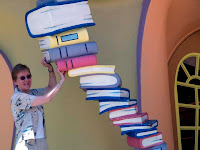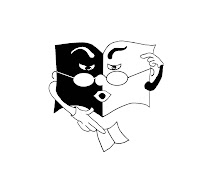Recently, I was able to talk with a group of teachers (and later a group of parents of preschool children) about an important milestone in children's development: when they first learn to read. What I learned is how many misconceptions there are out there, spurred on perhaps in part by the new hype in the last few years of teaching babies to read.
Blog: Parents and Kids Reading Together (Login to Add to MyJacketFlap)
JacketFlap tags: partnering, National Title I Conference, teamwork, parent involvement, cathy puett miller, Anytime Reading Readiness, Family engagement, Add a tag
Thank you to all of you who continue to follow this blog. I have been absent, struggling a bit as all of us do from time to time, with squeezing everything we want to do into the time and energy we have. I know that parents can relate to that.
A MEANINGFUL RE-START
With this post, I'd like to draw us back together and begin again the discussions about parents and kids reading together. This post is for parents of 2 year olds and parents of 22 year olds.
Please share this new post with your friends and tap them into an important resource.
GREETINGS FROM TAMPA, FLORIDA!
- Do you feel welcome at your child's school? Why or why not?
- Do you see your child's teacher as "friend" or "foe"? Why or why not?
- If you could stand in front of the Title I teachers from all other the country this week, what would you say to them?
Blog: Parents and Kids Reading Together (Login to Add to MyJacketFlap)
JacketFlap tags: Big 3 Literacy, Lowe's, tool for life, reading, family, safety, chapter books, parents, Fire, cathy puett miller, Pepsi Refresh, Add a tag
- Having properly installed smoke alarms cut the chances of dying in a reported fire by half. Install smoke alarms in every bedroom, outside every sleeping area and on every level of the home. Consider purchasing one with an escape light built in as well. Put a note on the calendar to test the smoke alarm on the first of every month.
- Be sure to place specially designed stickers from the fire department on the window of each child’s bedroom which will alert fire fighters that a child could be present in that room.
- <
Blog: Parents and Kids Reading Together (Login to Add to MyJacketFlap)
JacketFlap tags: literacy ambassador, finding time to read, cathy puett miller, fantastic reads, parentsrule, pat montgomery, vacation, librarians, parents, families, summer reading, Add a tag
WHAT IS THE SUMMER READING SLUMP?
Most of you reading this blog have probably heard of the "summer reading slump". It's simply the idea that when children are away from reading, especially during the years in which their reading skills are developed, they lose ground in their abilities. They read less and their skills grow weaker. This is true for children just finishing kindergarten and first grade but it is equally true for older kids, even those who have been reading for years.
The counterargument I hear from parents and caregivers most often, in response to this idea of children reading in the summer, is, "don't the children deserve a break?"
That's why I advocate summer reading be on a different channel. Reading doesn't have to look or feel like school work. In the summer more than any other time, it should be fun with lots of free choice and lots of opportunities rather than a structured "you've got to read now" approach. Don't confuse academic activities -- something your child only does in a classroom -- with the many purposes for reading and writing. And every book they read during the summer vaccinates them again losing ground they have gained during the year.
READING AND WRITING AREN'T JUST FOR SCHOOL (Think bigger, broader)
Think about how we as adults use reading and writing as tools every day. We read menus, grocery lists and advertisements, articles and emails on the Internet; we do some reading when we are selecting vacation destinations or planning trips. Reading and writing is all around us. And the reality is that often those who are most successful, who deal with the complexities of the modern world more easily, are those who have strong skills in this area. They can quickly scan through a complex advertisement or document and understand what it's about. On the other hand, if someone isn't a very good reader or writer, it can keep him or her from a job he or she would like to have. Minimal skills can prevent anyone from making informed, quick decisions that could impact one's very life or livelihood.
Again, let's go back to other areas in real life: if a child wants to be a star basketball player like Koby Bryant (or if we have dreams of him doing so), practice is part of the equation. I can't think of a skill that's more important to practice than reading.
RADIO SHOW
This very topic was the subject of a recent radio interview I did with host Pat Montgomery of the Parents Rule show on July 8th. If you weren't able to join us live, you can listen to a podcast of the show after the fact which I'll post as soon as it is available. One of the topics we d
Blog: Parents and Kids Reading Together (Login to Add to MyJacketFlap)
JacketFlap tags: parents, struggling readers, reading children parents kids, emergent literacy, cathy puett miller, beginning to read, Anytime Reading Readiness, Add a tag
 Kathy Stemke, the Educationtipster on Blogspot, recently called for an interview which you'll find posted on her blog. I always appreciate any opportunity to reach out and communicate to parents with children of all ages and certainly do this one.
Kathy Stemke, the Educationtipster on Blogspot, recently called for an interview which you'll find posted on her blog. I always appreciate any opportunity to reach out and communicate to parents with children of all ages and certainly do this one.
I certainly won't offer an entirely comprehensive answer here but enough to get you started and heighten understanding.
'
TEACHING READING
One of the wisest people in reading research today (Dr. Richard Allington) tells us that "there are many roads to reading". One size does not fit all. Different individuals come to reading through different mechanics. And reading is a multi-level complex set of skills rather than just one so it takes years to reach true competency. Part of the importance of partnerships between school and home is decyphering those needs and addressing them as needed with each individual youngster.
Children need to understand the alphabetic principal early on (knowledge of letters and shapes, their understanding that print has unique meaning and that letters represent sounds in our spoken language). As they gain the connection between letters and sounds, they now have the beginning tool to figure out the squiggles on the page. There is an excellent explanation of this part of reading on Reading Rockets in their First Year Teacher segment and it's devoid enough of education lingo to be of value to non-educator parents.
It Starts Long Before . . .
The truth is that the strongest readers are created from day one in a cocoon of language and experience with print. As I've often said, that doesn't mean creating a structured academic hothouse at home. It doesn't mean buying workbooks and sitting your 4-7 year old down at the table to work. It means experiencing literacy in all its forms in our world. If we could just get that right at the beginning, are consistent (just as we are in giving our children good nutrition or adequate exercise), and combine it with strong phonics instruction, we would virtually eliminate reading difficulties by first or second grade.
So my message to parents is always, "be the commercial for reading". Show children how interesting, how much fun reading is and, as Bob Keeshan AKA Captain Kangaroo says (I'm showing my age), "They will follow as the night follows the day." Read in front of them (not just novels, cereal boxes, street signs, bill board
Blog: Parents and Kids Reading Together (Login to Add to MyJacketFlap)
JacketFlap tags: dreams, family, Reading Tub, literacy ambassador, cathy puett miller, Anytime Reading Readiness, Add a tag
On this week's Share A Story Shape A Future blogging event sponsored by The Reading Tub, they pose the question:
Who is the person who influenced you most as a reader?
Here she is with her first grandson (someone she also influenced as a reader):
My mom
She's gone now from this earth but she sits on my shoulder every day. I see her putting a bowl on her head and prancing around the kitchen, reciting Robert Louis Stevenson's poem, The Land of Counterpane. I expect it was a meaningful poem since my brother and I both had times of extended illness in which we were confined to bed. It made us giggle and we loved the rhythm and rhyme of the poetry.
I see her pouring over a book, occasionally with those silly black framed glasses from the 1950's on her nose - do you know the ones with the wings? Her two most favorite authors were Phyllis Whitney and Eugenia Price (Momma loved historical fiction). As soon as I was in 5th or 6th grade and was a strong enough reader to attack these novels, she began sharing them with me and we'd have play fights over who would get the newest title first.
Although I cannot remember the first time I heard this phrase, I can still see that dreamy look in her eyes when she would tell me "you can go anywhere in a book" I believed her and I still do.
All her children believed her and their children (Nana's grandchildren) do too. What an incredible legacy this little feisty woman from the coal-mining country of Virginia has passed along, simply because she loved reading and books.
Today, she remains an influence not only in my personal reading (I have a good book or three or four on my bedside stand all the time) but also in my work as The Literacy Ambassador. Her passion for reading and stories and talking and sharing inspire me to this day. They are the reason I am an enthusiastic and passionate speaker, writer and advocate for the fact that "there is a book for every child". I know that without the indelible impression she left, I would not be doing what I am today. She, in fact, is the core of the revolution I am starting with my two new books, Anytime Reading Readiness and Before They Read. To learn more about that revolution, visit Reading is For Everyone
You can also stay in touch on Twitter and Facebook where you'll find me as litambassador and on Linkedin









Cathy--you were great on Parents Rule yesterday. Gave the listeners so many great ideas and fun ways to encourage reading. Thanks for what you do!